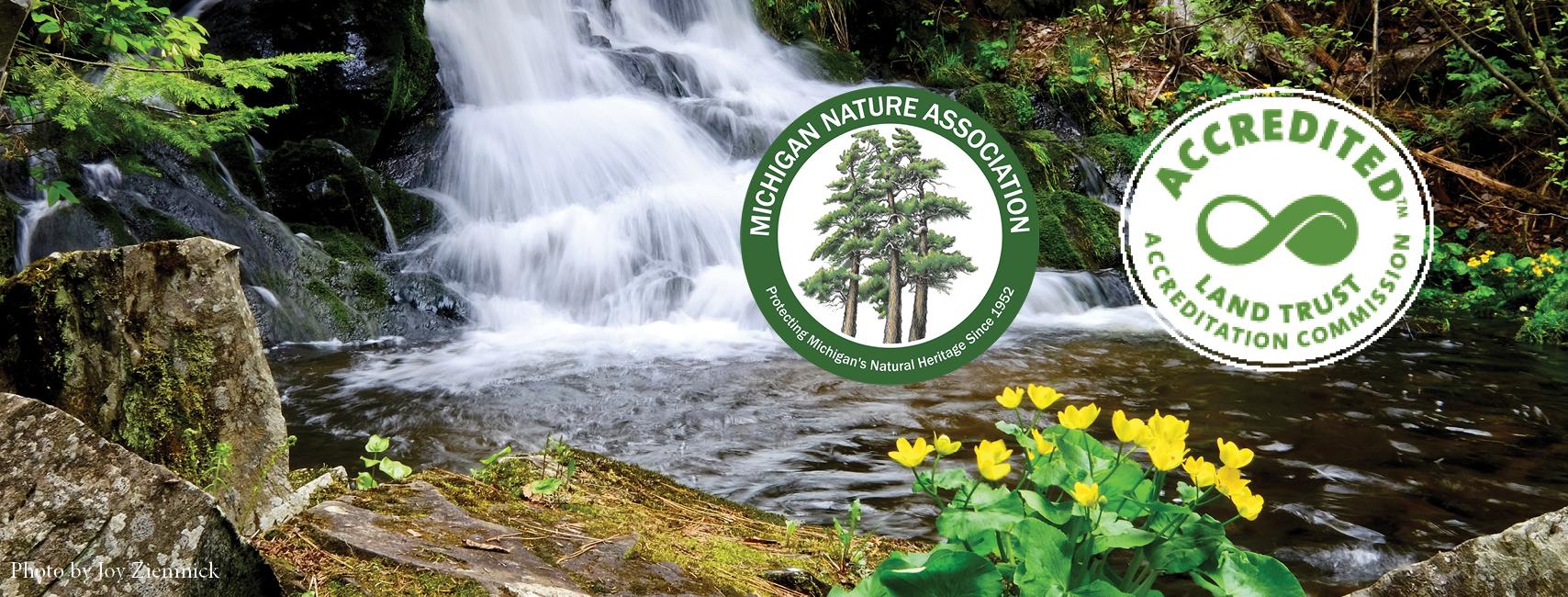Friday, Nov 8, 2019

One thing that unites us as a nation is land: Americans strongly support saving the open spaces they love. For more than 65 years, MNA has been doing just that for the people of Michigan. Today, MNA announced it has renewed its land trust accreditation – proving once again that, as part of a network of over 400 accredited land trusts across the nation, it is committed to professional excellence and to maintaining the public’s trust in its conservation work.
“Maintaining accreditation is one of the many ways MNA is committed to conservation excellence,” said Garret Johnson, MNA’s Executive Director. “It means our conservation work and business practices meet the highest professional standards within the national land trust community. Earning the accreditation seal, a true mark of distinction, speaks volumes to our members, donors, and the public about our ability to uphold their trust and protect important natural lands forever.”
MNA provided extensive documentation and was subject to a comprehensive third-party evaluation prior to achieving this distinction. The Land Trust Accreditation Commission awarded renewed accreditation, signifying its confidence that MNA’s lands will be protected forever.
Accredited land trusts now steward almost 20 million acres – nearly the size of the entire state of Michigan. MNA first achieved national accreditation through the Land Trust Accreditation Commission (LTAC) in 2014, and after review of MNA’s application for renewal this spring, the LTAC announced on Wednesday that MNA had successfully earned its first renewal. Accreditation is renewed every five years, and MNA is proud to have earned this designation.
“It is exciting to recognize MNA’s continued commitment to national standards by renewing this national mark of distinction,” said Tammara Van Ryn, Executive Director of the Commission. “Donors and partners can trust the more than 400 accredited land trusts across the country are united behind strong standards and have demonstrated sound finances, ethical conduct, responsible governance, and lasting stewardship.”
MNA is one of 1,363 land trusts across the United States according to the Land Trust Alliance’s most recent National Land Trust Census. A complete list of accredited land trusts and more information about the process and benefits can be found at www.landtrustaccreditation.org.
--
About MNA
Established in 1952, the Michigan Nature Association is a non-profit conservation organization committed to the protection and maintenance of special natural areas throughout the state. Through stewardship, MNA works to protect the rare and endangered plants and animals that reside in these areas, and promote a program of natural history and conservation education. For more than 65 years, MNA has worked to acquire and protect more than 175 nature sanctuaries from the northern tip of the U.P. to the Indiana/Ohio border. In 2019, MNA received an inaugural Planet Award from the Consumers Energy Foundation to protect rare, threatened and endangered plants and animals in eight counties across southern Michigan.
About the Land Trust Accreditation Commission
The Land Trust Accreditation Commission inspires excellence, promotes public trust and ensures permanence in the conservation of open lands by recognizing organizations that meet rigorous quality standards and strive for continuous improvement. The Commission, established in 2006 as an independent program of the Land Trust Alliance, is governed by a volunteer board of diverse land conservation and nonprofit management experts. For more, visit www.landtrustaccreditation.org.
About the Land Trust Alliance
Founded in 1982, the Land Trust Alliance is a national land conservation organization that works to save the places people need and love by strengthening land conservation across America. The Alliance represents 1,000 member land trusts supported by more than 200,000 volunteers and 4.6 million members nationwide. The Alliance is based in Washington, D.C., and operates several regional offices.
The Alliance’s leadership serves the entire land trust community—our work in the nation’s capital represents the policy priorities of land conservationists from every state; our education programs improve and empower land trusts from Maine to Alaska; and our comprehensive vision for the future of land conservation includes new partners, new programs and new priorities. Connect with us online at www.landtrustalliance.org.

Marshall Weingarden